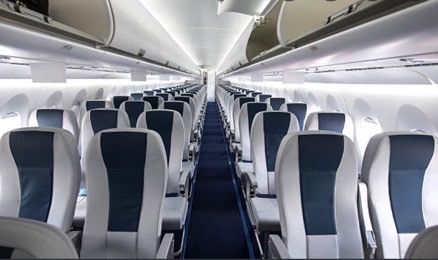
Dr. Liia Ramchandra
There are few things harder on your skin than air travel. When you combine the stress of flying with the harsh conditions in the cabin and the new protocols required by COVID-19, you end up with the worst possible scenario for keeping your skin clean and healthy.
Still, it is possible to arrive at your destination with glowing skin if you counterbalance the negative effects of air travel with a few proactive measures.

Moisturize before putting on your mask
Whether you are traveling or not, redness, breakouts, and acne can result from wearing the masks that have become a regular part of our lives due to the COVID-19 pandemic. In fact, masks can be so irritating to our skin that the breakouts they cause have come to be known as “maskne.”
Acne is most often the result of clogged pores. The oil, bacteria, and dead skin cells that are normally on your skin build up even more when you are wearing a mask. The result is blocked pores and acne outbreaks. Acne and redness can also be triggered by the humidity that your mask traps close to your skin. Finally, for those with sensitive skin or eczema, the pressure that a mask brings to your skin can cause irritation.

To fight back against these side effects, I recommend moisturizing with a light, non-oily moisturizer. It is also important to wear a clean, new mask. Cotton masks typically are lighter and more breathable, making them better at preventing acne. Rayon and polyester masks make it easier for humidity to be trapped close to your skin.
Think preflight, inflight, and postflight
There are things you can do during each phase of your trip that can help to keep your skin healthy. Before the flight, moisturizing is the most important step. Aircraft cabins are designed to remove humidity from the air. Your skin is most comfortable when humidity is between 40 and 70 percent. In an airplane’s pressurized cabin, the humidity drops to 20 percent. Your skin needs your help to have the right amount of moisture.
I also recommend that you do not put on any makeup before the flight that could contribute to clogging your pores. Traveling without foundation or makeup powder on your face will make it much easier for your pores to breathe.
During the flight, try to minimize the number of times that you remove and reapply your mask. You might periodically try to wipe your face clean with a damp cloth and pat it dry to remove any dirt or moisture from your skin, but other than that try to keep it in place as much as possible.
As soon as you are able after the flight, remove your mask and let your skin breathe! It is also a good idea to clean your face and moisturize again with a non-oily face cream.
You should also pay attention to the climate in the location where you have landed. If it is different from where you departed, you may need to adjust your skincare routine. For example, if you are traveling to a humid climate, you should be using very light moisturizers that will not clog your pores. If your destination is dry and cold, start using very hydrating and heavier moisturizers.
Pack something to ease your stress
Air travel has never been stress free. There are schedules to keep, lines to wait in, and terminals to navigate. The added safety precautions mandated by COVID-19 have added another layer to the stress of air travel
Stress affects your skin, making it harder to keep it clean and healthy. It prompts your body to release hormones that increase oil production in your skin glands. That means a greater chance of clogged pores. Help your skin by doing whatever you can to ease the stress that is common to air travel.
I suggest getting a great book to read during the flight, or packing your air-pods so you can watch a great movie or listen to some great music, a great meditation, or an audio book. Remind yourself that the flight is just a few hours and focus your thoughts on the destination ahead.
Dr. Liia Ramachandra, Pharm.D., Ph.D., is a serial entrepreneur and healthcare executive. Dr Liia is the Founder and CEO of EpiLynx, a gluten-free skin care and cosmetics brand. Her journey has given her experience in Global Medical Affairs, Global Ethics and Compliance, Clinical Research, and Global Publications. She has worked with multiple companies, including Takeda Pharmaceuticals Inc, Pfizer, and Astellas. Dr. Liia holds a Master’s degree and a Doctoral degree in Pharmacy from Groningen University, Netherlands, and PhD from the University of Utrecht, Netherlands.